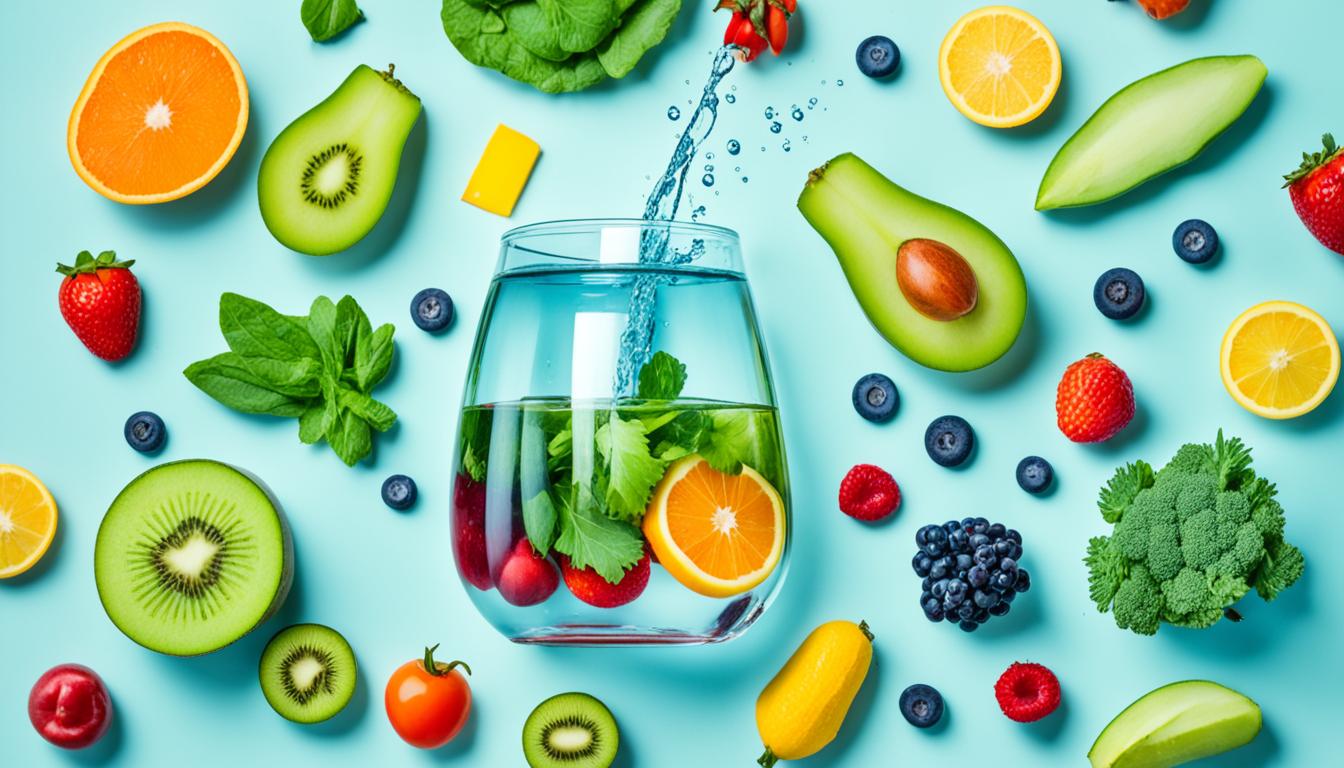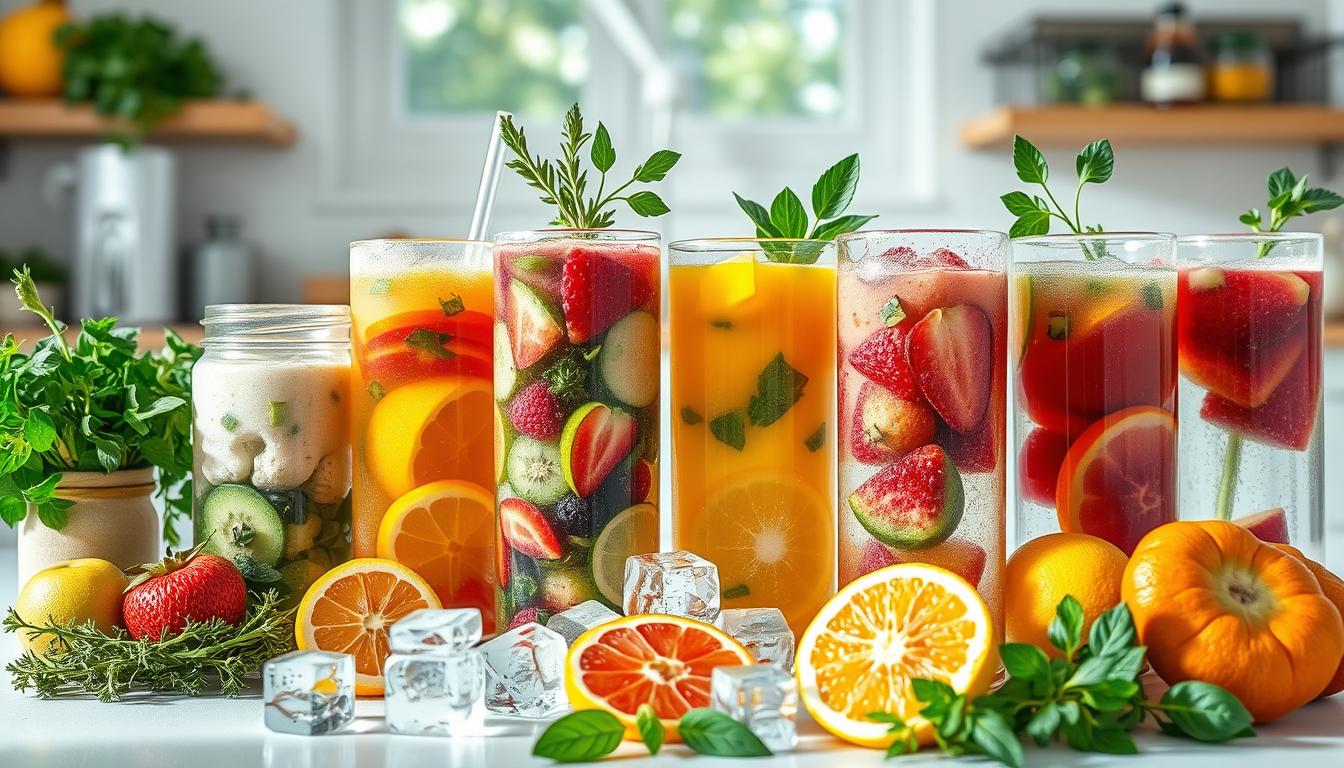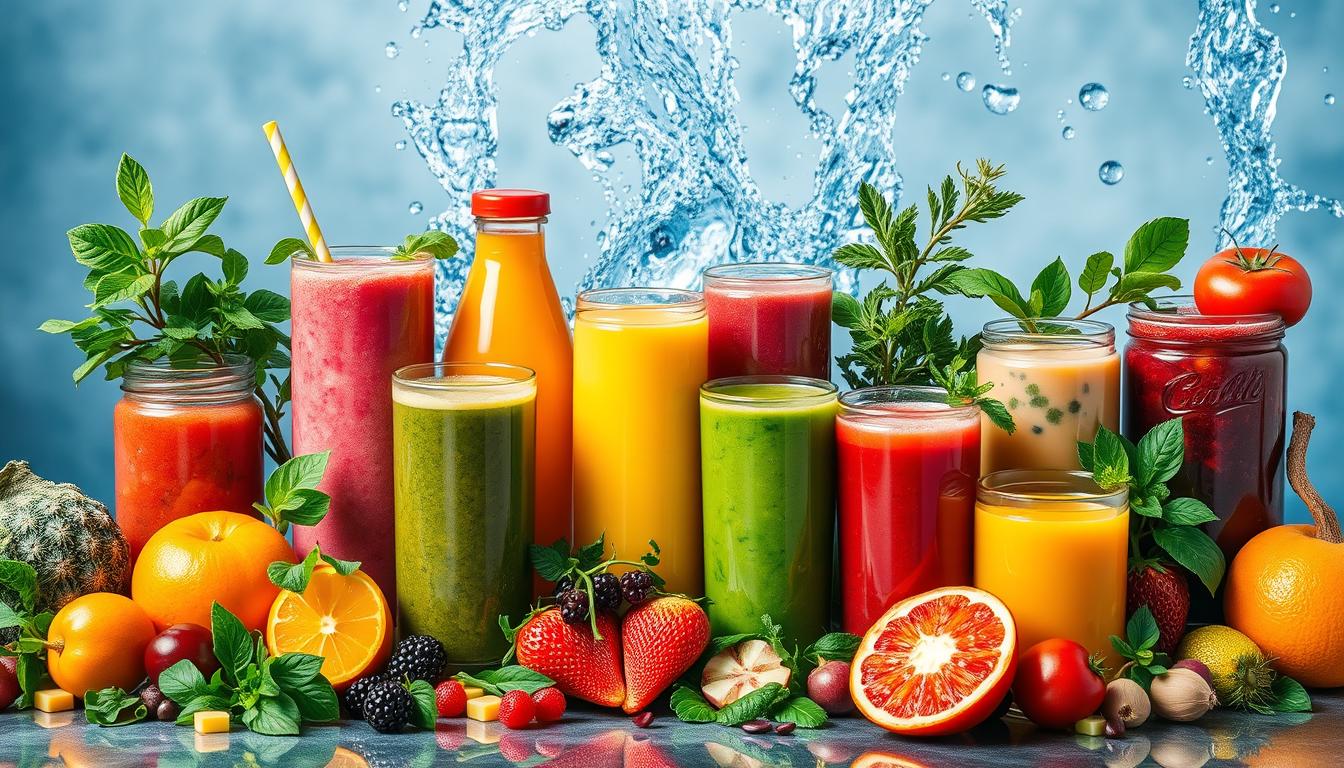Have you ever thought about how what you eat and drink affects how hydrated you are? It’s actually really important. The food and drinks you choose affect your body’s water intake and electrolyte balance. Avoiding dehydration is key for good health.
The human body is mostly water, about 60% in fact. Trying to stay hydrated is a must. While the old rule of drinking eight 8-ounce glasses daily is popular, there’s not much science to back it up. Instead, focus on foods and drinks that keep you well-hydrated.
Even losing 2% of your body’s water can cause dehydration signs. This might mess with your body temperature, make you lose motivation, and get you tired. Being well-hydrated can prevent these issues and might lower stress when you exercise hard.
Your mind needs water too. Just a 1-3% drop in fluids can ruin your mood, hurt your memory, and slow down your thinking. For a 150-pound (68 kg) person, this means losing about 1.5–4.5 pounds (0.5–2 kg) of weight due to fluid loss.
What can you do to stay well-hydrated? Focus on a diet with nutrient-dense foods that have a lot of water, like fruits and veggies. It’s also important to pay attention to cues like how thirsty you are or the color of your urine. Light yellow urine means you’re on the right track. By keeping up with your hydration, you help your kidneys, your brain, and enjoy better health all around.
The Relationship Between Diet and Hydration
The link between what we eat and how hydrated we are is key but often missed. Our food choices every day can really change how much we need to drink to stay hydrated. A diet full of fruits and veggies, which are packed with water, is great for keeping our bodies hydrated.
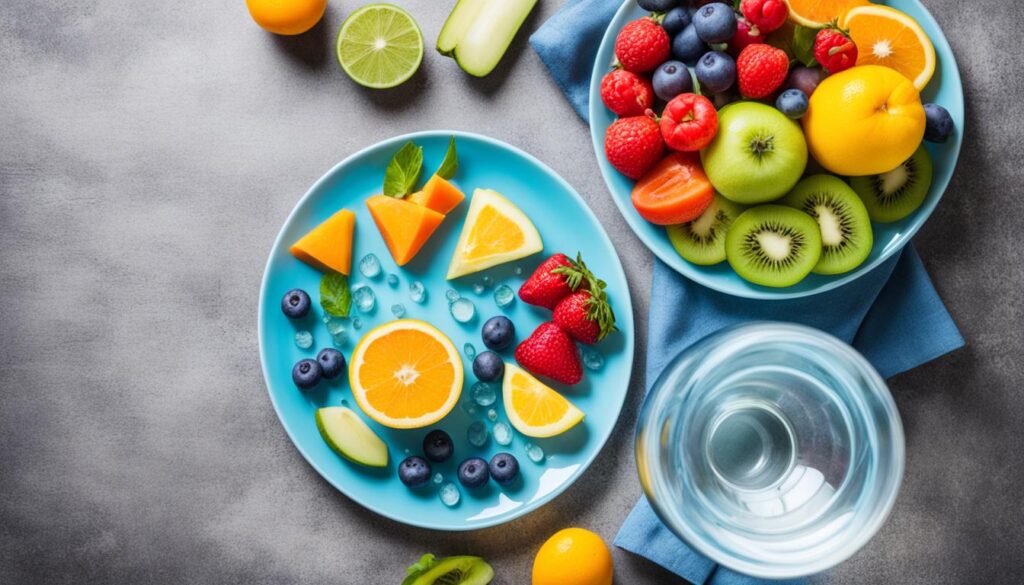
How Food Choices Impact Fluid Balance
Eating a lot of protein or choosing a low-carb diet can make your body lose more fluid. This happens because protein makes nitrogen waste, which you have to get rid of by peeing. And since low-carb diets, like keto, make your body use up stored water fast, you need more water to stay hydrated.
However, eating a wide range of nutritious foods can help you stay hydrated. Fruits and veggies are excellent because they’re mostly water:
- Watermelon: 92% water
- Strawberries: 91% water
- Cantaloupe: 90% water
- Peaches: 89% water
- Oranges: 88% water
The Role of Electrolytes in Hydration
Electrolytes are minerals like sodium, potassium, and magnesium. They help our bodies keep the right balance of fluids by moving water in and out of cells. If we don’t have enough electrolytes, we might get dehydrated and feel tired, get headaches, or have muscle cramps.
“Altered mechanisms of thermoregulatory vasoconstriction in aged human skin” (Thompson-Torgerson CS et al., 2008) talks about how the way older people control body temperature changes. It shows why keeping the right amount of electrolytes is important at any age.
To get enough electrolytes, eat a mix of foods that are full of these minerals:
| Electrolyte | Food Sources |
|---|---|
| Sodium | Table salt, pickles, olives, cheese |
| Potassium | Bananas, spinach, avocados, sweet potatoes |
| Magnesium | Almonds, cashews, pumpkin seeds, leafy greens |
| Chloride | Table salt, seaweed, celery, olives |
Drinking enough water is also crucial for your electrolyte balance. The European Food Safety Agency suggests men drink between 2.5 to 3.7 liters a day, and women drink between 2.0 and 2.8 liters. But, your needs might change depending on how old you are, how active, and the weather.
Choosing the right foods can really help with your hydration. It’s important for your health to eat plenty of foods that are good for you.
Diets That May Lead to Dehydration
A balanced diet is key for good health. But some diets can lead to dehydration. High-protein, ketogenic, and Atkins diets, along with intermittent and dry fasting, are examples. They might make you lose too much fluid and hurt your hydration.
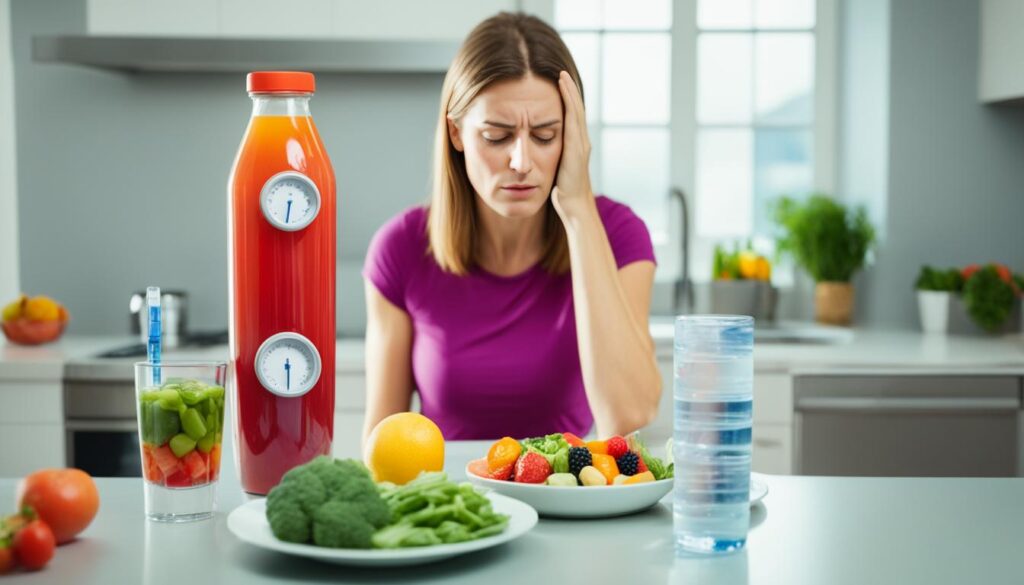
High-Protein Diets
Diets like Dukan and paleo focus on eating lots of protein. When your body processes all this protein, it gets rid of fluid and water. This can dry you out. For instance, a study found that athletes who ate a ton of protein got more dehydrated as they ate more.
Ketogenic Diet
The keto diet is all about eating high-fat and low-carb. It can help you lose weight fast through ketosis. But, as your body uses up its carbohydrate stores and you lose water, you can get dehydrated.
Intermittent Fasting
Intermittent fasting means you eat and then not eat, in turns. But, during the not-eating times, some people might forget to drink water. This happens especially if they eat only a few times a day. Forgetting to drink can dry you out.
Dry Fasting
Dry fasting takes intermittent fasting to the extreme by not allowing any food or drink. Without water for hours, the body can become dehydrated. Over time, this can cause many health problems related to dehydration.
Atkins Diet
The Atkins diet also has you eat low-carb. At first, you stop eating many fruits and veggies, which are hydrating. This can up your dehydration risk. So, watching your water intake is important when on this diet.
| Diet | Dehydration Risk Factors | Recommended Water Intake |
|---|---|---|
| High-Protein Diets | Increased nitrogen excretion, diuretic effect on kidneys | 8-12 cups (64-96 oz) per day |
| Ketogenic Diet | Rapid glycogen depletion, water weight loss | 8-12 cups (64-96 oz) per day |
| Intermittent Fasting | Reduced fluid intake during fasting periods | 8-12 cups (64-96 oz) per day |
| Dry Fasting | Complete restriction of food and liquids | Consult a healthcare professional |
| Atkins Diet | Elimination of hydrating foods like fruits and vegetables | 8-12 cups (64-96 oz) per day |
Dehydration on these diets can be prevented. Remember, drink at least 8-12 cups of water each day. Eating foods with lots of water, like leafy greens and certain fruits, can also keep you hydrated.
Does Diet Effect Hydration?
Your diet affects how hydrated you stay. What you eat can change your water and salt levels in your body. Diets with lots of protein or little carbs might make you lose more fluids. But a diet full of fruits and veggies can help you stay hydrated better.
Studies have proven eating right is key to being hydrated. A 2012 study by Palma ML and others showed eating water-rich foods is important for your skin. Another study in 2006 by Mac-Mary S and team looked at how mineral water in our meals affects our skin’s moisture. It proves what we eat affects how much water our body keeps.
Nutrients like sodium, potassium, and magnesium help keep body fluids balanced. They control how water moves in and out of our cells. In 2011, Palma ML and colleagues studied how drinking water connects to healthy skin. They found that staying hydrated is very important for our health.
Watching your urine and how thirsty you are can tell you a lot about your hydration. Clear or light yellow urine means you’re probably drinking enough water. But dark yellow or amber urine shows you might be dehydrated. Remember, it’s not enough to just drink when you’re thirsty. Eating foods that are full of water is important too.
| Study | Key Findings |
|---|---|
| Palma ML, et al. (2012) | Direct relationship between dietary water intake and skin hydration |
| Mac-Mary S, et al. (2006) | Dietary natural mineral water improves skin hydration in healthy subjects |
| Palma ML, et al. (2011) | Water intake is associated with skin hydration in a healthy population |
| Williams S, et al. (2007) | Fluid intake affects skin physiology, with differences between mineral and tap water |
To wrap it up, what you eat directly impacts how well hydrated you are. Eat foods with high water content and keep track of how much you drink. Listen to your body when it comes to being thirsty. And remember, the color of your urine can give you clues about your hydration level. By doing these things, you can maintain good hydration and support your overall health.
The Importance of Staying Hydrated
It’s crucial to keep hydrated for good health. The body is mostly water, around 60%. This makes it vital to drink enough water. Hydration is important for physical action, thinking, and avoiding health problems like headaches and not being able to go to the bathroom easily.
Benefits of Adequate Hydration
Drinking enough water helps you perform better and feel stronger. Just losing 2% of your body’s water makes you less able to move and think. Less water affects how the brain works, making you moody and your memory worse. Water helps with headaches too, with studies suggesting 50.7 ounces (1.5 liters) a day can make a big difference.
Water also helps your stomach work right, reducing constipation risk. More water means fewer kidney stones. After drinking alcohol, water helps get rid of a hangover because alcohol makes you lose water. Plus, drinking water helps you lose weight since it speeds up your body and helps you feel full.
Consequences of Dehydration
Not drinking enough water makes you tired, moody, and forgetful. Even a little dehydration can make you feel anxious. Serious lack of water can cause big health problems such as infections, kidney issues, and heat sickness.
Recommended Daily Water Intake
The usual advice is to drink eight 8-ounce glasses a day, but this can change depending on your age, if you’re a man or woman, how much you move, and where you live. Here’s a general look at how much water you might need:
| Demographic | Recommended Daily Water Intake |
|---|---|
| Men | 13 cups (approximately 3 liters) |
| Women | 9 cups (just over 2 liters) |
| Pregnant Women | 10 cups |
| Breastfeeding Women | 12 cups |
| Children and Teenagers | 6-8 cups (depending on age and activity level) |
About a third of your needed water comes from food, like watery fruits and vegetables. Watching the color of your pee can tell you if you’re drinking enough. Light yellow means you’re probably well hydrated. By focusing on water and smart food choices, you can stay hydrated and healthy.
Conclusion
Our diet is vital for keeping our bodies well-hydrated. What we eat daily can either help or hurt our hydration. For example, diets like keto or Atkins, which are high in protein and low in carbs, might make us lose more fluid, risking dehydration. But if we eat many fruits and veggies, which are full of water, we can stay hydrated better.
Hydrating properly is key for many health areas. It affects how well we do physically, think, digest food, and keep our kidneys healthy. Even a small amount of thirst can make us think less clearly, feel down, and forget things. Also, being well-hydrated is critical for doing our best in sports and other activities, especially when it’s not too hot. Drinking enough water and making sure we get the right minerals can avoid dehydration and its bad effects.
To keep our bodies hydrated, we should eat a mix of foods, keep track of how much we drink, and listen to our bodies when they tell us we need water. Peeing a light yellow, and drinking water often, are signs we’re doing it right. So, by focusing on staying hydrated and choosing smartly what we eat and drink, we can take care of our health. Always remember, what we consume affects how well our body is hydrated.

